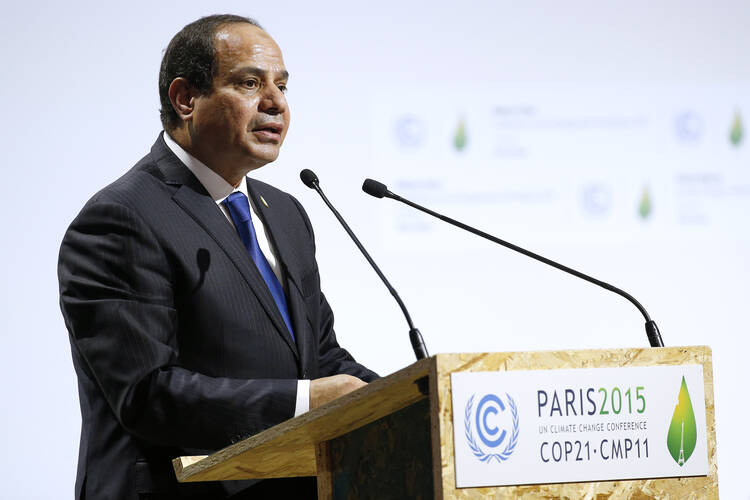Africa is among the world's regions most in need of a "just and clear" global accord to combat climate change, Egyptian President Abdel Fattah el-Sisi told the U.N. climate conference in Paris.
"All African nations are contributing less to the total harmful emissions and are the most affected by climate change," he told other global leaders at gathering.
The summit aims to achieve a legally binding and universal agreement on measures to stem climate change and protect the environment.
Earlier this year in Cairo, ministers and delegates from 54 African nations committed themselves to reaching a binding climate change agreement in Paris, but they indicated that any accord would need to reflect Africa's "priorities and aspirations," the U.N. Environment Program reported at the time. The report highlighted worst-case scenarios for Africa if global warming went unabated:
If temperatures increase by 4 degrees Celsius, "projections for Africa suggest sea levels could rise faster than the global average and reach 80 cm above current levels by 2100 along the Indian and Atlantic Ocean coastlines, with particularly high numbers of people at risk of flooding in the coastal cities of Mozambique, Tanzania, Cameroon, Egypt, Senegal and Morocco," the report warned.
After Pope Francis' June encyclical, "Laudato Si', on Care for Our Common Home," Bishop Emanuel Barbara of Malindi, Kenya, described the pope's message as a "radical encyclical that opens our eyes to our situation" that should push people across the region to speak loudly about environmental issues.
"We need development program that respects the environment and is tailored to the African context," Bishop Barbara told Catholic News Service at the time.
"It is important that we do not copy the development model used in other parts of the world as we now know what happens when development goes ahead with no regard for consequences," he said.
Sisi, who leads a climate change committee of African leaders at the U.N., has presented his and other African initiatives to face climate change and called for international technical and financial support to help the continent's different countries face climate change impacts.
"Africa demands an international, just and clear agreement that considers disparity of burdens between developed and developing countries," Sisi on the opening day of the Nov. 30-Dec. 11 conference.
Leading up to the U.N. conference, the World Bank announced a plan of action to help Africa deal with increased poverty due to climate change impacts, some of which were already "unavoidable," accord or no accord, the World Bank said.
It said those included "the loss of cropland, a decline in crop production, worsening undernourishment, higher drought risks and a decline in fish catches."
The conference gathers more than 150 countries and hundreds of other concerned groups from around the world, including communities of Catholic priests, nuns and laypeople working against the backdrop of "Laudato Si'," which argues that a change of heart is necessary to protect the earth and all its inhabitants.
On the way home from his late-November trip to Africa, Pope Francis said it would be tantamount to "a suicide" if a global climate accord is not reached soon.
Many scientists argue that an increase in natural disasters such as flooding, droughts and rising sea levels across the world are all but inevitable if limits are not placed on the greenhouse gases causing global warming.
But those gases are caused by fossil fuels, which many poor countries depend on for energy and income. Any agreement on global warming must therefore contain measures that safeguard the poor, through financing and technology, say their advocates.
Tens of thousands of Dominican Catholic missionaries told developed countries at the U.N. conference to "take the lead in the reduction of carbon emissions to ensure not more than a 1.5 degree Celsius increase over pre-industrial levels."
Speaking of the need to come up with an agreement that does not further compromise those who have already suffered the worst due to climate change across the world in general, they added, "Finances and technology for adaptation and mitigation with no strings attached must be provided to the nations who have been and are struggling with the impacts of climate change."
"As Dominican Sisters and Brothers engaged in various parts of the world where we witness the devastating effects of climate change, especially on the most vulnerable, we are here in Paris to urge a redoubling of efforts to ensure the Paris summit results in a strong and legally binding agreement," the more than 180,000 Dominican priests, sisters, brothers, and laity stated in an open letter on the gathering's fourth day.








